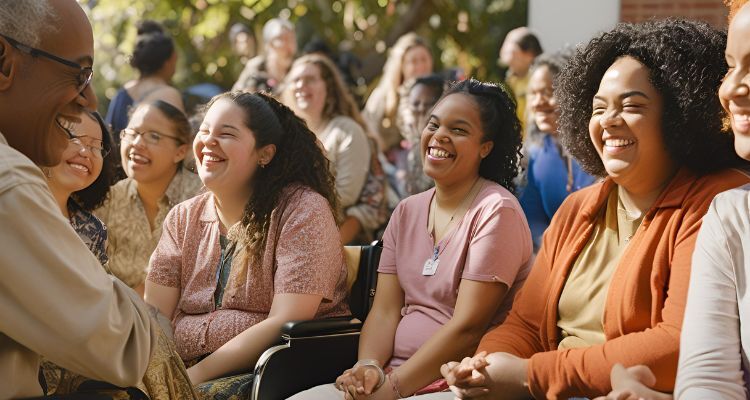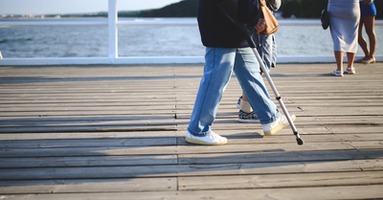
American Association of People with Disabilities (AAPD): A Comprehensive Overview
The American Association of People with Disabilities (AAPD) stands as a beacon of hope, advocacy, and empowerment for the disability community in the United States. Established in 1995, AAPD has consistently worked towards ensuring that people with disabilities have equal rights and opportunities to live fulfilling lives. As a national cross-disability rights organization, AAPD's influence spans across various aspects of society, from employment and education to healthcare and accessibility. By advocating for policies that promote inclusion and equity, AAPD strives to eliminate the barriers that people with disabilities face daily.
The Importance of Disability Rights
Disability rights are an essential component of human rights, reflecting the need for dignity, respect, and equal treatment for all individuals, regardless of their physical or mental abilities. In a world where people with disabilities have historically been marginalized, organizations like AAPD play a crucial role in advocating for their rights and ensuring that they are recognized as equal members of society. Disability rights encompass a wide range of issues, including access to education, employment, healthcare, and public spaces, all of which are critical to the overall well-being and independence of people with disabilities.
AAPD’s Mission and Vision
Mission Statement
The mission of AAPD is to ensure the political and economic empowerment of all people with disabilities. By focusing on advocacy, policy change, and programmatic initiatives, AAPD seeks to create a society in which individuals with disabilities have equal opportunities to participate fully in all aspects of life.
Vision for the Future
AAPD envisions a world where people with disabilities are valued and respected as equal members of society. The organization strives to eliminate barriers and promote accessibility, ensuring that individuals with disabilities can live independently, pursue their educational and career goals, and engage actively in their communities.
Core Values and Principles
AAPD is guided by a set of core values and principles that emphasize equality, inclusion, and empowerment. These values underpin all of the organization’s efforts and drive its commitment to creating a more just and inclusive society for people with disabilities.
History and Formation of AAPD
The Founding of AAPD in 1995
The American Association of People with Disabilities was founded in 1995 by a group of disability rights advocates who recognized the need for a unified voice in the fight for disability rights. At a time when the disability community was fragmented and lacked a strong national presence, AAPD emerged as a platform to bring together people with disabilities, their families, and allies to advocate for change. The organization was established with the belief that people with disabilities should have the same opportunities and rights as anyone else, and that a national organization was needed to champion these rights at the highest levels of government and society.
Early Goals and Challenges
In its early years, AAPD faced numerous challenges as it sought to establish itself as a leading voice in the disability rights movement. One of the primary goals was to build a strong and diverse membership base that reflected the cross-disability nature of the organization. This was no small feat, as the disability community is incredibly diverse, encompassing people with a wide range of physical, sensory, cognitive, and mental health conditions. AAPD also aimed to raise awareness about the unique challenges faced by people with disabilities and to advocate for policy changes that would address these issues.
Evolution and Growth Over the Years
Since its founding, AAPD has grown significantly in both size and influence. The organization has expanded its programs and initiatives to address the evolving needs of the disability community. Over the years, AAPD has played a pivotal role in shaping disability policy in the United States, advocating for the passage of key legislation and working to ensure that the rights of people with disabilities are protected. Today, AAPD is recognized as one of the leading disability rights organizations in the country, with a strong presence in Washington, D.C., and a nationwide network of members and allies.
Advocacy and Policy Initiatives
Political Advocacy for Disability Rights
Political advocacy is at the heart of AAPD’s work. The organization is committed to ensuring that the voices of people with disabilities are heard in the halls of power. AAPD works closely with lawmakers, government agencies, and other stakeholders to advocate for policies that promote the rights and well-being of people with disabilities. This includes lobbying for the passage of new legislation, as well as working to protect and strengthen existing laws that safeguard disability rights.
Legislative Achievements and Milestones
Over the years, AAPD has achieved numerous legislative victories that have had a profound impact on the lives of people with disabilities. One of the organization’s most significant achievements was its role in the passage of the Americans with Disabilities Act (ADA) Amendments Act of 2008, which restored and clarified the broad protections of the original ADA. AAPD has also been instrumental in advocating for the Affordable Care Act, which includes provisions that improve access to healthcare for people with disabilities. These legislative successes are a testament to AAPD’s unwavering commitment to disability rights.
Current Policy Focus Areas
AAPD’s policy agenda is shaped by the needs and priorities of the disability community. Some of the key issues that the organization is currently focused on include employment, healthcare, education, and accessibility. AAPD is also working to address the intersectionality of disability with other social justice issues, such as race, gender, and economic inequality. By focusing on these critical areas, AAPD aims to create a more inclusive and equitable society for people with disabilities.
Collaborations with Government and NGOs
Collaboration is a key component of AAPD’s advocacy strategy. The organization works closely with government agencies, non-governmental organizations (NGOs), and other disabled advocacy groups to advance its policy goals. These partnerships enable AAPD to amplify its impact and reach a broader audience. By working together with like-minded organizations, AAPD is able to leverage its resources and expertise to achieve meaningful change for people with disabilities.
AAPD’s Role in the Americans with Disabilities Act (ADA) Advocacy
The Americans with Disabilities Act (ADA) is one of the most significant pieces of civil rights legislation for people with disabilities in the United States. AAPD has been a staunch advocate for the ADA since its inception, working to ensure that the law is fully implemented and enforced. The organization has also been at the forefront of efforts to strengthen and expand the ADA, advocating for amendments and other legislative changes that enhance the rights of people with disabilities. AAPD’s work in this area has been instrumental in ensuring that the ADA remains a powerful tool for advancing disability rights.
Employment Initiatives
Promoting Employment for People with Disabilities
Employment is a critical issue for the disability community, as people with disabilities often face significant barriers to finding and maintaining jobs. AAPD is dedicated to promoting employment opportunities for people with disabilities and advocating for policies that support inclusive workplaces. The organization works to raise awareness about the value of hiring people with disabilities and provides resources and support to both job seekers and employers.
Internship and Fellowship Programs
AAPD offers various programs to support the professional development of individuals with disabilities, including:
- Summer Internship Program: Provides college students and recent graduates with disabilities the opportunity to gain work experience in Washington, D.C.
- Disability Rights Storytellers Fellowship: Empowers individuals with disabilities to share their stories and advocate for their rights through media and storytelling.
The Disability Equality Index (DEI)
The Disability Equality Index (DEI) is one of AAPD’s flagship initiatives aimed at promoting disability inclusion in the workplace. The DEI is a comprehensive benchmarking tool that helps companies measure their disability inclusion policies and practices. By participating in the DEI, companies can gain valuable insights into their performance in areas such as accessibility, recruitment, retention, and advancement of employees with disabilities. The DEI also serves as a platform for recognizing companies that are leading the way in disability inclusion.
Employment Statistics and Challenges
Despite progress in recent years, people with disabilities continue to face significant challenges in the labor market. According to recent statistics, the unemployment rate for people with disabilities is nearly double that of the general population. Additionally, many people with disabilities who are employed are underemployed, working in jobs that do not fully utilize their skills and abilities. AAPD is working to address these challenges by advocating for policies that promote equal employment opportunities and by providing resources and support to job seekers with disabilities.
AAPD’s Employment Resources and Programs
AAPD offers a variety of resources and programs to support people with disabilities in their employment journey. These include job training and placement services, mentorship programs, and networking opportunities. AAPD also provides guidance and support to employers who are looking to create more inclusive workplaces. Through these initiatives, AAPD is helping to break down the barriers that people with disabilities face in the workforce and promote greater economic independence.
Success Stories in Disability Employment
One of the most powerful ways to demonstrate the impact of AAPD’s work is through the success stories of individuals who have benefited from the organization’s employment initiatives. These stories highlight the challenges that people with disabilities face in the workforce, as well as the positive outcomes that can be achieved with the right support and resources. By sharing these stories, AAPD aims to inspire others and show that people with disabilities can succeed in a wide range of careers.
Education and Awareness Programs
Education as a Pillar of Empowerment
Education is a fundamental right and a key pillar of empowerment for people with disabilities. AAPD is committed to ensuring that people with disabilities have access to quality education and the support they need to succeed academically. The organization advocates for policies that promote inclusive education and works to raise awareness about the importance of accessibility in educational settings.
The NBCUniversal Tony Coelho Media Scholarship
The NBCUniversal Tony Coelho Media Scholarship is one of AAPD’s signature education programs. Named after former Congressman Tony Coelho, a champion of disability rights, this scholarship provides financial support to students with disabilities who are pursuing careers in media, communications, or entertainment. The scholarship aims to empower the next generation of disability advocates by providing them with the tools and resources they need to succeed in their chosen fields.
Disability Rights Storytellers Fellowship
The Disability Rights Storytellers Fellowship is another key initiative aimed at promoting education and awareness. This fellowship provides people with disabilities the opportunity to share their stories and experiences through various media platforms. By amplifying the voices of people with disabilities, AAPD aims to raise awareness about the challenges and opportunities they face, and to promote a more inclusive and accurate portrayal of disability in the media.
Educational Outreach and Partnerships
AAPD’s educational outreach efforts extend beyond scholarships and fellowships. The organization works closely with schools, universities, and other educational institutions to promote inclusive education and provide resources and support to students with disabilities. AAPD also partners with other organizations to develop and implement educational programs that address the unique needs of the disability community.
The Impact of Educational Programs
The impact of AAPD’s educational programs can be seen in the success of the students and fellows who have participated in these initiatives. Many have gone on to achieve great things in their careers and have become powerful advocates for disability rights. By providing people with disabilities with the education and support they need to succeed, AAPD is helping to build a more inclusive and equitable society.
Healthcare Advocacy
Accessibility in Healthcare
Access to healthcare is a fundamental right, yet many people with disabilities face significant barriers when it comes to receiving the care they need. AAPD is dedicated to advocating for accessible healthcare for all people with disabilities. This includes advocating for policies that improve access to medical facilities, equipment, and services, as well as raising awareness about the unique healthcare needs of the disability community.
AAPD’s Work in Health Policy
AAPD’s work in health policy is focused on ensuring that people with disabilities have access to the care they need to live healthy, fulfilling lives. The organization advocates for policies that address the specific health needs of people with disabilities, including access to preventive care, mental health services, and long-term care. AAPD also works to ensure that healthcare providers are trained to meet the needs of people with disabilities and that healthcare facilities are accessible to all.
Addressing Health Disparities
Health disparities are a significant issue for the disability community. People with disabilities often experience poorer health outcomes compared to the general population, due in part to barriers to accessing care. AAPD is working to address these disparities by advocating for policies that promote health equity and by raising awareness about the unique health challenges faced by people with disabilities. This includes advocating for the collection of data on health disparities and the development of targeted interventions to address these issues.
Collaborations with Healthcare Providers
Collaboration with healthcare providers is a key component of AAPD’s healthcare advocacy efforts. The organization works closely with hospitals, clinics, and other healthcare providers to improve accessibility and ensure that people with disabilities receive the care they need. This includes providing training and resources to healthcare professionals on how to meet the needs of patients with disabilities, as well as advocating for the inclusion of disability in healthcare quality improvement initiatives.
Success Stories in Healthcare Advocacy
AAPD’s healthcare advocacy efforts have led to numerous successes, from policy changes that improve access to care, to individual success stories of people with disabilities who have received the care they need to live healthy, fulfilling lives. These stories highlight the impact of AAPD’s work and demonstrate the importance of continued advocacy for accessible healthcare.
Accessibility and Mobility
Ensuring Accessibility in Public Spaces
Accessibility in public spaces is a critical issue for people with disabilities, as it affects their ability to fully participate in society. AAPD is committed to advocating for accessible public spaces, including buildings, transportation, and recreational areas. The organization works to ensure that people with disabilities have access to the same opportunities and experiences as everyone else, and that public spaces are designed with accessibility in mind.
Advocacy for Accessible Transportation
Accessible transportation is essential for people with disabilities to live independent lives. AAPD advocates for policies that improve access to transportation for people with disabilities, including accessible public transit, paratransit services, and ride-sharing options. The organization also works to raise awareness about the importance of accessible transportation and to ensure that people with disabilities are included in transportation planning and policy decisions.
The Role of Technology in Accessibility
Technology plays a crucial role in improving accessibility for people with disabilities. AAPD is at the forefront of advocating for the development and adoption of accessible technologies, including assistive devices, accessible websites, and mobile apps. The organization also works to ensure that people with disabilities have access to the latest technologies that can help them live more independent lives. In the digital age, AAPD emphasizes the importance of digital accessibility. They work with tech companies and policymakers to ensure websites, apps, and digital services are accessible to people with disabilities, following standards such as the Web Content Accessibility Guidelines (WCAG).
Successes in Mobility Advocacy
AAPD’s mobility advocacy efforts have led to significant improvements in accessibility for people with disabilities. From policy changes that improve access to transportation, to the development of new technologies that enhance mobility, AAPD’s work has had a profound impact on the lives of people with disabilities. These successes demonstrate the importance of continued advocacy for accessible transportation and mobility solutions.
Future Challenges and Opportunities
While significant progress has been made in improving accessibility and mobility for people with disabilities, there are still challenges that need to be addressed. AAPD is committed to continuing its advocacy efforts to ensure that people with disabilities have access to the transportation and mobility solutions they need to live independent lives. The organization also recognizes the importance of staying ahead of emerging trends and technologies that could impact accessibility in the future.
Legal Advocacy and Rights Protection
Legal Protections for People with Disabilities
Legal protections are essential for safeguarding the rights of people with disabilities. AAPD is dedicated to advocating for strong legal protections that ensure people with disabilities are treated fairly and have access to the same opportunities as everyone else. This includes advocating for the enforcement of existing laws, such as the Americans with Disabilities Act (ADA), as well as working to strengthen and expand legal protections for people with disabilities.
AAPD’s Role in Legal Advocacy
AAPD plays a crucial role in legal advocacy for people with disabilities. The organization works to ensure that people with disabilities have access to legal representation and support when their rights are violated. AAPD also advocates for the development and implementation of laws and policies that protect the rights of people with disabilities and promote their full inclusion in society.
Notable Legal Cases and Precedents
Over the years, AAPD has been involved in numerous legal cases that have set important precedents for disability rights. These cases have helped to clarify and expand the rights of people with disabilities and have had a lasting impact on disability law in the United States. By advocating for the rights of people with disabilities in the courts, AAPD has helped to ensure that these rights are upheld and protected.
The Impact of Legal Advocacy on Disability Rights
Legal advocacy is a powerful tool for advancing disability rights. Through its legal advocacy efforts, AAPD has helped to secure important victories for people with disabilities and to ensure that their rights are recognized and protected. These efforts have had a profound impact on the disability community, helping to break down barriers and promote greater inclusion and equality.
Challenges in Legal Advocacy
While legal advocacy has led to many important victories for disability rights, there are still challenges that need to be addressed. People with disabilities continue to face discrimination and barriers to accessing legal representation and support. AAPD is committed to addressing these challenges and to continuing its work to ensure that people with disabilities have the legal protections they need to live full and independent lives.
AAPD’s Community and Membership
Building a Cross-Disability Community
One of the key strengths of AAPD is its ability to bring together people with disabilities from across the country to form a strong and united community. AAPD’s cross-disability approach recognizes that people with disabilities are a diverse group with a wide range of needs and experiences. By building a cross-disability community, AAPD is able to advocate for policies and programs that address the needs of all people with disabilities, regardless of their specific condition.
Membership Benefits and Opportunities
AAPD offers a variety of benefits and opportunities to its members. These include access to resources and information on disability rights, opportunities to participate in advocacy and policy initiatives, and the chance to connect with other people with disabilities and allies. AAPD also offers leadership development programs and other opportunities for members to get involved in the organization’s work.
The Role of Community in Advocacy
Community is at the heart of AAPD’s advocacy efforts. By bringing together people with disabilities, their families, and allies, AAPD is able to build a strong and united voice for disability rights. The organization’s community-based approach to advocacy ensures that the needs and priorities of the disability community are at the forefront of its work.
Testimonials from AAPD Members
Testimonials from AAPD members highlight the impact that the organization has had on their lives. Many members credit AAPD with helping them to achieve greater independence and empowerment, and with providing them with the support and resources they need to succeed. These testimonials serve as a powerful reminder of the importance of AAPD’s work and the positive impact it has on the lives of people with disabilities.
Engaging with AAPD’s Community Online
In today’s digital age, AAPD recognizes the importance of online engagement in building and sustaining its community. The organization offers a variety of online platforms and resources to help members stay connected and engaged with its work. This includes social media channels, newsletters, and online forums where members can share their experiences, ask questions, and participate in discussions on disability rights and advocacy.
Media and Storytelling Initiatives
The Power of Storytelling in Advocacy
Storytelling is a powerful tool for advocacy, and AAPD recognizes the importance of amplifying the voices of people with disabilities. By sharing their stories and experiences, people with disabilities can help to raise awareness about the challenges they face and the importance of disability rights. AAPD’s storytelling initiatives provide a platform for people with disabilities to share their stories and to advocate for change.
The Disability Rights Storytellers Fellowship
The Disability Rights Storytellers Fellowship is one of AAPD’s signature storytelling initiatives. This fellowship provides people with disabilities the opportunity to share their stories and experiences through various media platforms. By amplifying the voices of people with disabilities, AAPD aims to raise awareness about the challenges and opportunities they face, and to promote a more inclusive and accurate portrayal of disability in the media.
Media Representation of People with Disabilities
Media representation plays a crucial role in shaping public perceptions of people with disabilities. AAPD is committed to advocating for accurate and positive representation of people with disabilities in the media. This includes working with media outlets to ensure that people with disabilities are portrayed in a way that is respectful, accurate, and inclusive. AAPD also works to raise awareness about the importance of media representation in promoting disability rights and inclusion.
AAPD’s Media Outreach and Campaigns
AAPD’s media outreach efforts are focused on raising awareness about disability rights and promoting the organization’s work. This includes launching media campaigns that highlight the importance of disability rights and the impact of AAPD’s advocacy efforts. AAPD also works to ensure that the voices of people with disabilities are included in media coverage of disability-related issues.
Successes in Changing the Disability Narrative
AAPD’s storytelling and media initiatives have had a significant impact on changing the narrative around disability. By amplifying the voices of people with disabilities and advocating for positive media representation, AAPD has helped to challenge stereotypes and promote a more inclusive and accurate portrayal of disability. These successes demonstrate the power of storytelling and media in advancing disability rights.
Key Programs and Initiatives
Disability Mentoring Day (DMD)
Disability Mentoring Day is an annual event coordinated by AAPD that connects students and job seekers with disabilities to mentors from various industries. This initiative helps participants explore career opportunities and gain valuable insights.
REV UP Campaign
The REV UP Campaign (Register! Educate! Vote! Use your Power!) is an AAPD initiative aimed at increasing the political participation of people with disabilities. The campaign focuses on voter registration, education, and mobilization to ensure that the disability community's voice is heard in elections.
Disability Rights Storytellers Fellowship
This fellowship program empowers individuals with disabilities to share their personal stories and advocate for disability rights through media and storytelling. Fellows receive training and support to create impactful narratives that raise awareness and drive change.
Partnerships and Collaborations
Collaborating with Other Disability Organizations
Collaboration is a key component of AAPD’s work. The organization works closely with other disability organizations to advocate for policies and programs that benefit the disability community. By working together, AAPD and its partners are able to amplify their impact and achieve greater success in advancing disability rights.
Partnerships with Corporations and Foundations
AAPD also partners with corporations and foundations to support its work. These partnerships provide valuable resources and support that help AAPD to carry out its programs and initiatives. By partnering with the private sector, AAPD is able to leverage its resources and expertise to achieve greater impact in advancing disability rights.
Government Partnerships
Government partnerships are another important aspect of AAPD’s work. The organization works closely with federal, state, and local governments to advocate for policies that benefit people with disabilities. These partnerships help to ensure that the needs and priorities of the disability community are reflected in government policy and programs.
Impact of Collaborative Efforts
The impact of AAPD’s collaborative efforts can be seen in the many successes the organization has achieved in advancing disability rights. By working together with other organizations, corporations, foundations, and governments, AAPD has been able to achieve significant progress in areas such as employment, healthcare, education, and accessibility. These collaborations have also helped to build a strong and united disability community that is better equipped to advocate for its rights.
Future Collaboration Opportunities
AAPD recognizes the importance of continuing to build and strengthen its partnerships and collaborations in order to achieve its mission. The organization is always looking for new opportunities to collaborate with other organizations, corporations, foundations, and governments to advance disability rights. By continuing to build these partnerships, AAPD is able to achieve greater impact and success in its work.
Funding and Support
AAPD’s Funding Sources
AAPD’s work is made possible by the generous support of its donors and partners. The organization relies on a variety of funding sources, including individual donations, corporate sponsorships, grants, and government funding. These funds are used to support AAPD’s programs and initiatives and to ensure that the organization is able to continue its work in advancing disability rights.
The Role of Donations and Grants
Donations and grants play a crucial role in supporting AAPD’s work. Individual donations provide essential support for the organization’s programs and initiatives, while grants from foundations and government agencies help to fund specific projects and campaigns. AAPD is committed to being transparent about its funding sources and to ensuring that donor funds are used effectively to support its mission.
Corporate Sponsorships and Partnerships
Corporate sponsorships and partnerships are another important source of funding for AAPD. By partnering with corporations, AAPD is able to leverage additional resources and expertise to support its work. These partnerships also provide opportunities for corporations to demonstrate their commitment to disability inclusion and to support AAPD’s mission.
AAPD’s Approach to Financial Management
AAPD is committed to responsible financial management and to ensuring that its funds are used effectively to support its mission. The organization has a strong track record of financial stewardship and is committed to being transparent about its finances. AAPD’s approach to financial management is guided by its commitment to accountability and to ensuring that donor funds are used to achieve the greatest possible impact.
How to Support AAPD
There are many ways to support AAPD’s work. Individuals can make a donation, become a member, or participate in one of AAPD’s fundraising events. Corporations and foundations can partner with AAPD to support its programs and initiatives. By supporting AAPD, donors and partners are helping to advance disability rights and to create a more inclusive and equitable society for people with disabilities.
AAPD’s Future Vision and Goals
Strategic Priorities for the Future
AAPD’s vision for the future is guided by its commitment to advancing disability rights and creating a more inclusive society. The organization’s strategic priorities include expanding its advocacy efforts, increasing its impact in key areas such as employment, healthcare, education, and accessibility, and continuing to build a strong and united disability community. AAPD is also committed to addressing emerging challenges and opportunities in the disability rights movement.
Innovation and Growth in Advocacy
Innovation is a key component of AAPD’s approach to advocacy. The organization is committed to finding new and innovative ways to advance disability rights and to create positive change for people with disabilities. This includes leveraging new technologies, building new partnerships, and exploring new approaches to advocacy. AAPD is also focused on growing its impact by expanding its reach and engaging new audiences in its work.
The Role of Technology in AAPD’s Future
Technology plays a crucial role in AAPD’s vision for the future. The organization recognizes the potential of technology to improve accessibility, enhance communication, and empower people with disabilities. AAPD is committed to advocating for the development and adoption of accessible technologies and to ensuring that people with disabilities have access to the tools and resources they need to live independent lives.
Building a More Inclusive Society
AAPD’s ultimate goal is to build a more inclusive and equitable society for people with disabilities. This includes advocating for policies and programs that promote disability inclusion, raising awareness about the importance of accessibility, and working to eliminate the barriers that people with disabilities face. AAPD is committed to continuing its work to ensure that people with disabilities have the same opportunities as everyone else and to create a society that values and respects the rights of all people.
AAPD’s Commitment to the Disability Community
At the heart of AAPD’s vision for the future is its commitment to the disability community. The organization is dedicated to ensuring that the voices of people with disabilities are heard and that their needs and priorities are reflected in its work. AAPD is committed to being a strong and effective advocate for the disability community and to continuing its work to advance disability rights and create a more inclusive society.
The American Association of People with Disabilities (AAPD) has been at the forefront of the disability rights movement for over two decades. Through its advocacy, programs, and initiatives, AAPD has made significant progress in advancing the rights and inclusion of people with disabilities. The organization’s work is guided by its commitment to empowering people with disabilities, promoting disability rights, and creating a more inclusive and equitable society. As AAPD looks to the future, it remains committed to continuing its work to break down barriers and to ensure that people with disabilities have the same opportunities as everyone else. By supporting AAPD’s work, individuals, corporations, and foundations can help to create a more inclusive and equitable society for people with disabilities and to advance the cause of disability rights.
.png)





